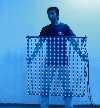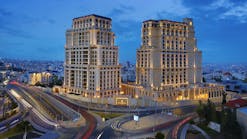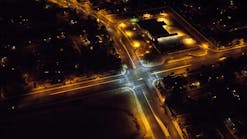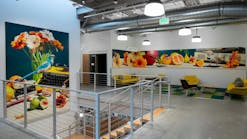In a theatrical or concert setting, the transparency allows actors and objects behind the display to be visible when lit and also allows back-lighting of performers through the display (see Dido article). G-LEC systems can be used on stage to hide and reveal whole orchestras and bands and to provide brilliant and dynamic graphics that may also be used to add texture and even conceal unsightly speaker stacks.
60 mm pixel pitch
The LightFrame and PhantomFrame displays consist of aluminium frames measuring 0.96 x 0.96 m. The frames hold 16 parallel polycarbonate tubes, spaced 60 mm apart. The tubes each contain 16 LED pixels mounted on a linear PCB, with a pixel separation of 60 mm. The result is that each frame is a 16 x 16-pixel display with a pitch of 60 mm. G-LEC recommends a minimum viewing distance of 5 m, or 20 m for high resolution graphics using the PhantomFrame.
The LightFrame weighs 9.8 kg while the PhantomFrame is only 5.5 kg (6 kg/m2). The frames are designed to be robust and easily assembled and mounted with a minimum amount of manpower. The frames also have a transparency of 70-75% to light, sound and wind.
"We've already registered a great deal of interest from architectural as well as stage designers, especially for large displays," said Lars Wolf, Managing Director of G-LEC Europe. "We predict [these products] will soon become a firm favourite in theatres and television, with architectural use as an intriguing possibility."
PhantomFrame graphics
The PhantomFrame is designed to provide ultra bright, fast and smooth graphics. Housed inside each frame is the LED driver and signal decoder electronics, and up to 12 frames can be controlled by one Phantom graphics computer. are guaranteed to create enchantment and excitement amongst any audience.
Two graphic databases store still and animated images that can be played back individually or merged. Video input can also be merged with one of the two databases, while the graphics engine manages encoding and transmission, allowing the two graphic streams to be processed at full video speed. The level of each LED in each pixel is calculated and allocated to the matrix layout of the display.
Control is optimised with a user friendly screen allowing recording, selection, playback and manipulation of the images in the database, which can also be externally controlled by 23 channels of DMX512 input.








